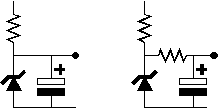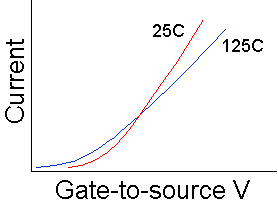3. do you know any other hybrid topology?
Thank you very much in advance for your time.
best regards.
Harry.
In spite of the plentiful appearance of zener diodes in this journal's schematics, I fear the zener's sometime erratic break voltage and noise. I have found that bypassing a zener seldom eliminates all the noise. Consequently, when a voltage reference is needed, the best plan is to decouple the zener's output with an RC network.
Subject: Possible topic for next issue
Firstly I am glad to tell you your Journal being for me the only interesting webzine regarding tubes! My compliments!
Perhaps I have an interesting topic for one of the next issues:
I have experimented with several topologies for hybrid class A power amps to combine the superior voltage gain characteristics of tubes with the current capabilities of solid state devices. Other goals were to eliminate output capacitors, preferably even using no coupling capacitors at all nor using interstage transformers. I really dislike the sound of DC servo circuits sometimes seen.
Today I am rather satisfied with this topology:
an ECC83 as long tailed pair receiving the input and the voltage feedback signal DC coupled to a SRPP built around an ECC88. The SRPP is 'grounded' through a 100V zener diode string, carrying 10 ma. The SRPP output I have coupled through a zener diode string into the gates of 2
MOSFETs ( 2SK1530 ) in parallel, loaded by a constant current source of 2 identical MOSFETs. This zener diode string conducts 1 mA DC created by a resistor from MOSFET gate to output.
These amplifiers deliver 20 watts in 7 ohm. The sound quality combines detail, warmth, sound staging with firm and precise bass. Especially the 'attack' or liveliness is remarkable. High-end friends are always very impressed.
However, being always looking for improvement, I have following questions for you.
1. what is your opinion on using zener diodes to carry ac (in stead of capacitors or interstage transformers)
2. is there a better substitute for MOSFETS as follower, e.g. a Darlington, Quad triplet or compound transistors? I believe in current gain transistors are essentially more linear than MOSFETs.

One trick seldom used is just to use a two resistor voltage divider. Yes, you will lose signal voltage, but often we have more signal voltage than we need. But nothing is going to beat the purity of the signal leaving the resistor divider.
MOSFETs are not all that their PR and rumors make them out to be. The high impedance, voltage driven aspect of their grid is welcome, but not the heavy capacitance. The negative conduction with increasing temperature relationship that prevent thermal runaway is often true at only excessively high currents.

|
|
||
|
|
||